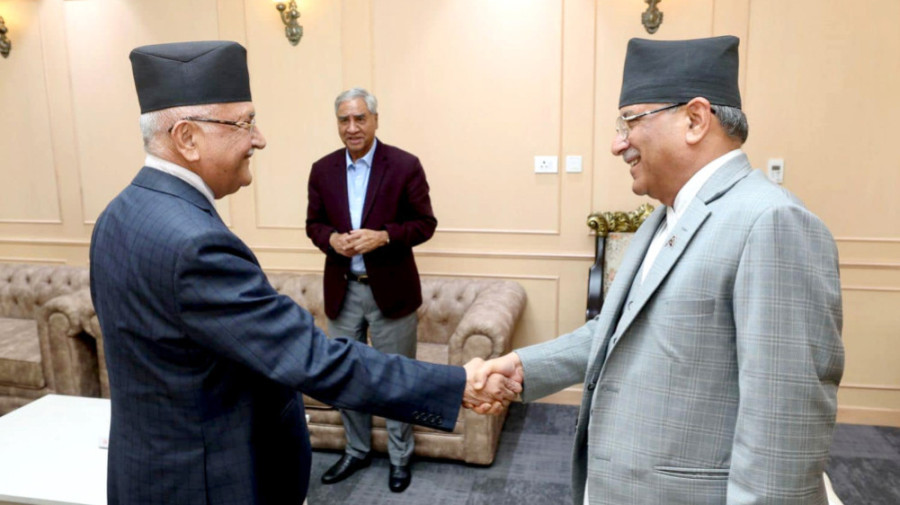Editorial
It’s only words
The UML claims high ideals to explain its support for the Dahal government. There is room to doubt it.
Overnight political change isn't something new in Nepal. So when Prime Minister Pushpa Kamal Dahal broke ties with the Nepali Congress and switched over to the CPN-UML last week, people were hardly surprised. In the past few decades, three big parties—the Nepali Congress, the CPN-UML and the Maoist Centre—have ruled the country turn by turn, forever changing coalitions and partners at their convenience. Friends turning foes and vice-versa in the course of accumulating power and perks has become accepted practice across parties.
One notices something different this time around, though. The largest party in the new coalition, the UML, which is more than double the size of the prime minister's party, the CPN (Maoist Centre), joined the Dahal-led Cabinet without taking important ministerial portfolios such as finance, home, foreign and energy, which is something uncommon in Nepal's context.
The fast Cabinet formation was also unusual. Dahal appointed ministers for all the ministries by Saturday—within a week after he changed coalition. Earlier, it used to take months for prime ministers to pick ministers as the coalition partners would endlessly squabble over whom to give plum ministries like home and finance. Last time, it took three months for Dahal to give full shape to his Cabinet.
Responding to queries about why they this time didn't claim powerful portfolios, the UML leaders gave lofty answers. They say they joined the government out of the party’s responsibility to pull the country out of the morass of multiple problems. They describe it as their magnanimity and claim that the UML is guided more by national responsibility than getting plum portfolios at any cost. Yet people are unconvinced, as the years-long track record of the same parties and the leaders suggest otherwise. Whatever the UML top leaders might say, the perception is that they gave unconditional support to Dahal as they were desperate to enter Singha Durbar.
Out of power not only at the centre but also in all seven provincial governments, the UML was losing its strength in other vital state organs such as the National Assembly as well. It's not hard to understand that Oli joined hands with Dahal after being cornered in national politics. Just like Dahal ditched Deuba by breaching the understanding of handing over government leadership to the Congress leader, relations between the two communist chiefs may sour in the course of running the government or on the issue of handing over government leadership—which, in fact, is exactly what happened back in 2021 when Oli and Dahal were sharing power.
UML chair Oli used every trick in the book to prolong his stay in power until the Supreme Court ordered his removal and appointed Congress president Sher Bahadur Deuba as prime minister in July 2021. Oli’s misuse of power and even the President’s Office is still fresh in people's minds. Other recent activities also suggest Oli's impatience. If they are really committed to walking the talk and playing a vital role in resolving the country's pressing problems by rising above partisan interests, it would indeed be great service to the country. That, in turn, will also gradually build public trust in the party. Given the quick pace of Nepali politics, it will not be long before the UML’s new commitment to helping the country achieve a semblance of political stability and economic growth is put to test.




 13.12°C Kathmandu
13.12°C Kathmandu














